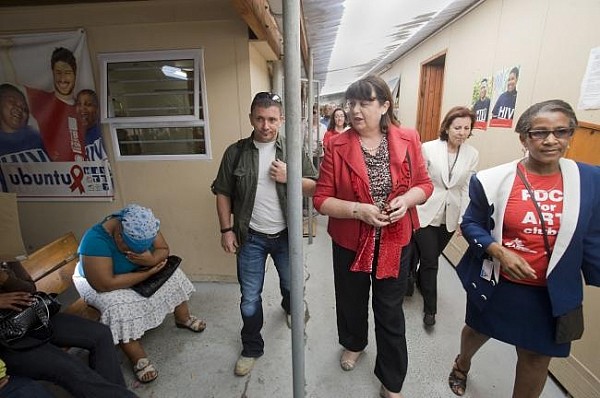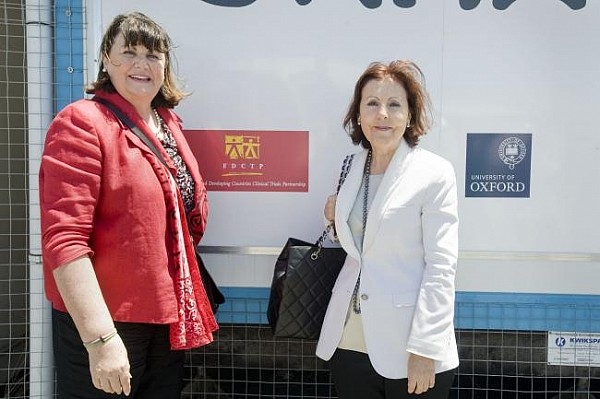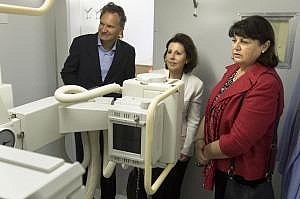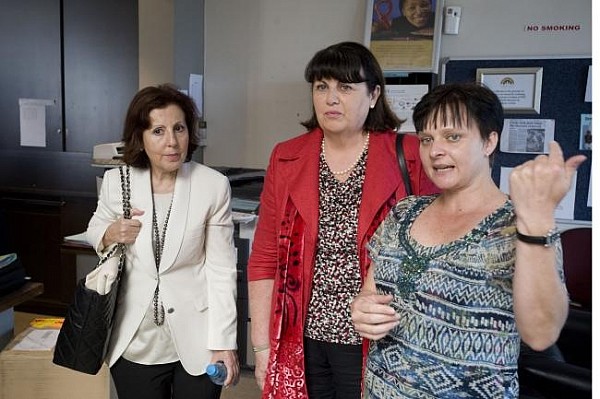Atividade Parlamentar Report of the visit to Cape Town with Commissioner Geoghegan-Quinn
Maria da Graça Carvalho, invited by Commissioner Máire Geoghegan-Quinn, has visited Cape Town from 4 to 6 November to speak at a high-level conference on European and Developing Countries Clinical Trials Partnership programme (EDCTP), and to participate in a visit to two clinical sites and several bilateral meetings. The visit took place under the scope of the 15th anniversary of the signing of the Science & Technology Cooperation Agreement between South Africa and the European Union.
The European and Developing Countries Clinical Trials Partnership EDCTP was established in 2003 as a first joint research programme of 16 European countries and co-funded by the EU through the 6th Framework Programme for Research and Innovation. It plays an exemplary role in European Union's international cooperation. As the first programme launched under the article 169 (presently article 185) initiative, EDCTP has succeeded in establishing a genuine partnership with its African partners. This involves capacity strengthening and competence development; multi-disciplinary collaboration and trans-national support as well as the drawing up of agreed common rules for selecting and funding clinical research.
The Conference
The high-level conference aimed at preparing the second European and Developing Countries Clinical Trials Partnership programme (EDCTP-2) on 5 November in Cape Town. The EDCTP-2 conference was organised jointly by the South African Department for Science & Technology and the European Commission.
The EDCTP-2 high-level conference marked an important step in the consultation of African and international stakeholders on the second EDCTP programme (EDCTP2, 2014-2024) and in rising additional public/private engagement and support to EDCTP. It provided a forum to discuss stakeholders needs, opportunities and expectations in EDCTP2, as well as to provide endorsement and announce commitments and pledges.
The projects
MEP Carvalho has visited two of the EDCTP clinical sites on 6 November, namely the Cross Roads Clinic in Nyanga and the Khayelitsha Community Health Clinic.
The Cross Roads Clinic project, aiming at identifying potential challenges to the inclusion of adolescents in HIV prevention trials by the use of HPV vaccine as a proxy. It enrolled 834 adolescents at six sites across South Africa, of which 816 chose to be vaccinated. The project developed also an ethical-legal guide for conducting clinical trials with adolescents, which is becoming and international used reference.
The Khayelitsha Community Health Clinic is coordinated by Professor Robert Wilkinson, full professor at Imperial College. The project aims at evaluating the protective efficacy of a new TB vaccination administrated to healthy, HIV-infected adults in South Africa, Senegal and Gambia. The vaccine candidate MVA8A has been developed by the Oxford Emergent Tuberculosis Consortium ( a joint venture between Emergent BioSolutions and the University of Oxford established in 2008).
Bilateral meetings
Ms. Carvalho has also held several bilateral meetings:
- With Key EDCTP Interlocutors:
- Pascoal Mocumbi, High Rep, EDCTP and former Prime Minister of Mozambique;
- Charles Mgone, Exec Dir, EDCTP;
- Hannah Akuffo, Chairperson, EDCTP
- With Derek Hanekom, SA Minister of Science and Technology
- With Foundations which are interested in continuing and increasing the financing the EDCTP-2, namely with Trevor Mundel, President of the Bill & Melinda Gates Foundation´s Global Health Program.
- With Aaron Motsoaledi, SA Minister of Health
- With Nqaba Ngcobo, Chair of SA Parliament's S&T Portfolio Committee
- A meeting with Louis Augusto Pelembe, Minister of Science and Technology of Mozambique
Conclusions
The EDCTP initiative has become a true success story and is an excellent example of a mutually beneficial EU-Africa partnership, helping to tackle the global challenge of poverty-related infectious diseases and make progress towards the Millennium Development Goals.
In the process, the African partners have retained a high degree of ownership and leadership. Similarly, the initiative has helped train hundreds of African researchers and medical doctors through its fellowship programme and other training schemes. At the same time, the funding aims to foster clinical research in Africa in a sound ethical and regulatory environment. As such, it is an indispensable pre-condition for carrying out clinical trials meeting international standards. Consequently, the programme has proven itself to be a model that will guide us in the future.
The principle of mutual partnership is demonstrated through the proactive empowerment of the researchers from sub-Saharan Africa. This enables them to prioritise research to solve their own problems as well as to lead research projects.
But we also had the confirmation that our rules and procedures are too complex and need to be simplified and that rules should allow in a simple way to combine different sources of budgets.
Simplification is particularly pertinent in a context in which it is necessary to bring together funding from a number of different budgets, namely a multitude of public and private funds (different national programmes, third countries contributions, private sector, charities and foundations), to deal with challenges that are often costly (such as clinical trials in humans).
The EDCTP has proven to be a programme which finances projects contributing to improve health standards, which represents a development in science and serves directly the community with very positive results.




